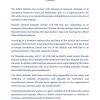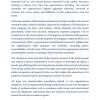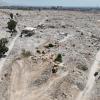
Legal Paper: Human Rights Response After the Fall of the Syrian Regime
Legal Paper: Human Rights Response After the Fall of the Syrian Regime
After more than five decades of violence and repression—including over a decade that stands as the bloodiest in the country’s history—the Syrian people have managed to bring an end to dictatorship and oppression. An opportunity has now emerged to rebuild and restore societal bonds, revive methods of expression and dialogue, and uphold values of equality, human dignity, and free will. This moment calls for revitalising society, enabling its members to establish a new social contract between its diverse components. Achieving this requires fostering a cultural and social reality grounded in respect for the rule of law and expanding spaces for tolerance, alongside agreement on a foundational transitional justice project to secure social peace, political stability, and eliminate the drivers and spread of violence.
While preparing a conducive environment for reconciliation requires the commitment of all Syrians across their affiliations and positions, the greatest responsibility falls on those who led the change and the current government overseeing the country’s affairs. Their role is to navigate a time-bound and consensual transition, laying the foundations for democratic governance and ensuring a pathway to peace and the envisioned Syrian state.
As the undersigned civil society organisations, we demand the current government and military leadership take the following measures:
1. Protecting Evidence and Sensitive Sites to Ensure Justice and Accountability
- Immediate closure of security headquarters and detention centers in areas previously under the control of the former government or any party to the conflict to preserve records, documents, and forensic evidence. These must be protected from tampering in preparation for their collection and classification by specialists for future accountability and justice processes, including the search for the missing.
- Special protection for evidence related to detainees, the forcibly disappeared, mass graves, and torture sites, with documentation of victims’ identities. Collaboration with victims’ associations and civil society organisations working on preserving such records is essential.
- Protection of mass grave sites from tampering or destruction. Any exhumation or search for bodies must be halted unless conducted under professional oversight. Forensic science must be the sole method for identifying remains to ensure evidence preservation and avoid obstructing investigative efforts. Exhumations and identifications should comply with internationally accepted standards, using scientific protocols and unified systems for numbering and documentation to ensure accurate and transparent identification.
- Facilitation of international investigative teams efforts to collect testimonies and information regarding potential mass graves and preserve these sites and their contents as credible evidence for use in trials, truth commissions, reparations, historical records, and other mechanisms Syrians may agree upon in the future.
- Preserve electronic copies of detention records from official and secret detention centers and military hospital registries as groundwork for a future national detainee database.
2. Establishing a Temporary Judicial Authority
- Appoint a committee of trusted jurists and former judges with no record of human rights violations to form a temporary judicial authority with the following tasks:
- Regulate the arbitrary releases of detainees that have occurred in recent days by working with judicial enforcement departments to document and address the status of released criminal detainees.
- Establish a temporary national committee for documenting the missing, including representatives from Syrian human rights organisations, victims’ associations, and families of the disappeared, to consolidate documented data into a centralised and continuously updated national database.
- Impose house arrest or safeguards on former government officials, Al-Baath Party leaders, heads of unions and syndicates, and others believed to possess information or evidence regarding human rights violations or government corruption.
- Implement measures to prepare for accountability of military or civilian officials against whom credible evidence confirms involvement in gross and systematic human rights violations, including actions such as arrest or travel bans.
3. Enhancing Cooperation with International and Local Organisations
- Fully cooperate with international mechanisms, including the International, Impartial, and Independent Mechanism (IIIM), the Independent International Commission of Inquiry on Syria (COI), and the Independent Institution on Missing Persons in the Syrian Arab Republic (IIMP). Facilitate the relocation of their offices to Damascus, should they decide to do so.
- Facilitate access for UN bodies, humanitarian actors, and relief teams to reach those in need without obstacles. Accelerate entry permits to alleviate the deteriorating humanitarian situation across the country.
- Cooperate with Syrian civil society organisations, leveraging their expertise gained throughout the years of conflict, and exempt them from administrative licensing requirements or approvals to relocate their offices within Syria and resume operations freely.
4. Supporting Released Detainees and Families of the Missing
- Provide immediate health and psychological support for recently released detainees and their families, including medical care for physical and psychological needs, and specialised counseling to help address trauma and reintegrate into society.
- Establish temporary survivor support centers in various provinces to register their names, document their numbers, and assist with identifying and accounting for missing persons and the forcibly disappeared.
5. Access to Information and Document Organisation
- Urge citizens who have obtained documents from security centers and official institutions after the regime’s fall to hand them over to the authorities. Establish a confidential hotline to ensure the caller’s identity is protected while reporting possession of such documents, facilitating their formal handover at designated collection centers across all provinces.
- Recognise the right to access information by enabling citizens to review all documents, data, regulations, and administrative orders issued by the government and intended for public disclosure. A dedicated platform should be established for governmental circulars and decisions to prevent misinformation and rumors.
Signatory Organisations:
- Syrian Center for Media and Freedom of Expression
- Lawyers and Doctors for Human Rights (LDHR)
- Al-Kawakibi Center for Transitional Justice and Human Rights
- Caesar Families Association
- Syrian Network for Human Rights (SNHR)
- Synergy Association for Victims
- Association of Victims of Chemical Weapons (AVCW)
- Detainees’ Voice Team
- Families for Truth & Justice (FTJ)
- DAWLATY Organisation
- Do Not Suffocate the Truth Campaign
- Kurdish Committee for Human Rights (Al-Rasid)
- Local Development and Small-Projects Support (LDSPS)
- Syrians for Truth and Justice- STJ
- Families for Freedom (FfF)
- URNAMMU for Justice and Human Rights
- The Day After Organisation
- Fraternity Foundation for Human Rights (FFHR)
- Families for Truth & Justice (FTJ)
- Mari Research and Development
- Pro-justice
- Adel Center For Human Rights
- The White Helmets
- AGORA
- Release Me
- ASHNA for Development
- Syrian Lawyers Aggregation
- Association of Detainees & The Missing in Sednaya Prison (ADMSP)
- ANALYSIS AND STRATEGIC STUDY ORGANIZATION
- Syrian Forum
- Analysis and Strategic Study Organization( ASO)
- Swpm
- Center for Civil Society and Democracy
- Badael
- Access Center for Human Rights (ACHR)
- The Syria Campaign
- *Women’s Organization for Transitional Justice*
- ASHNA for development
- Al-Marsad- Arab Human rights Center in Golan Heights
- Jana Watan
- Syrian Volunteers Netherlands (SYVNL)
- Synergy Association for Victims
- Musawa/women studies centre
- Massar Families Association.
- Baytna pour le soutien de la société civile




